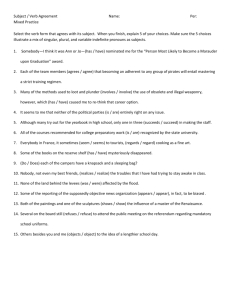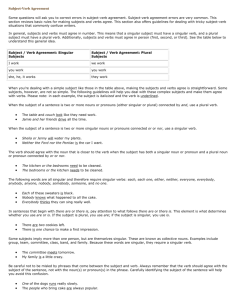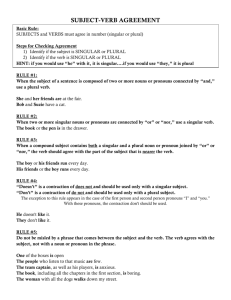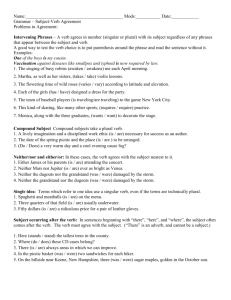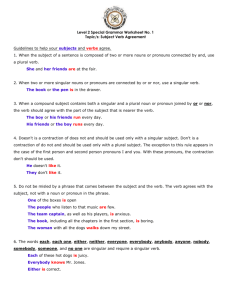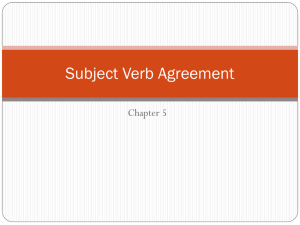Subject-Verb Agreement Worksheet: American Literature
advertisement
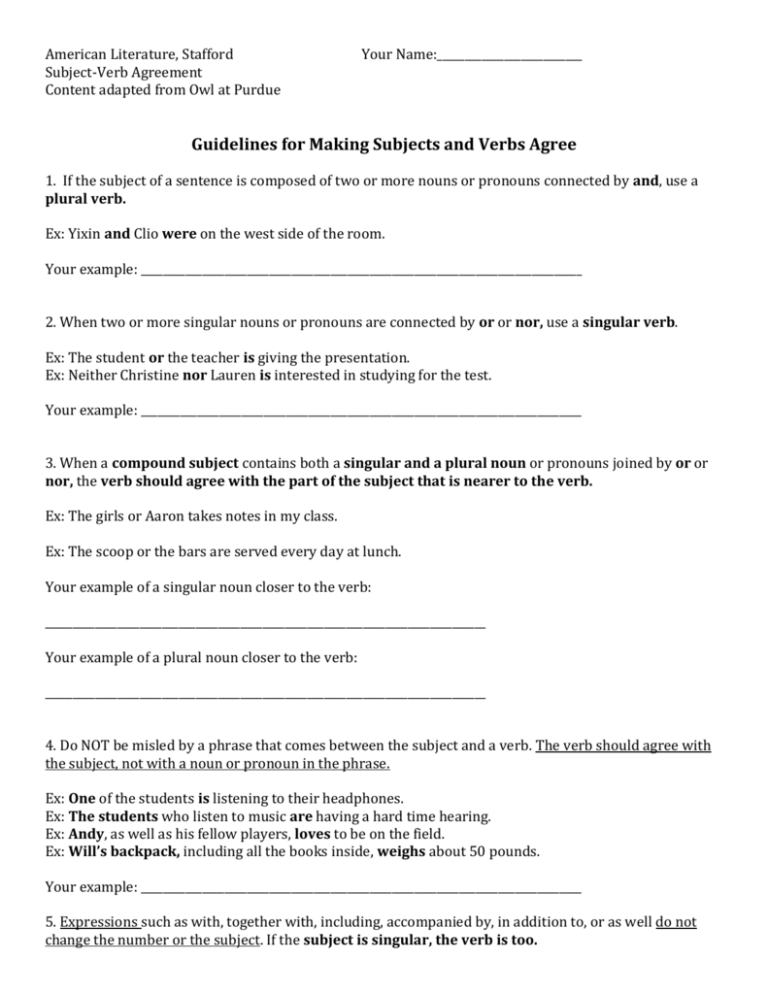
American Literature, Stafford Subject-Verb Agreement Content adapted from Owl at Purdue Your Name:__________________________ Guidelines for Making Subjects and Verbs Agree 1. If the subject of a sentence is composed of two or more nouns or pronouns connected by and, use a plural verb. Ex: Yixin and Clio were on the west side of the room. Your example: _______________________________________________________________________________ 2. When two or more singular nouns or pronouns are connected by or or nor, use a singular verb. Ex: The student or the teacher is giving the presentation. Ex: Neither Christine nor Lauren is interested in studying for the test. Your example: _______________________________________________________________________________ 3. When a compound subject contains both a singular and a plural noun or pronouns joined by or or nor, the verb should agree with the part of the subject that is nearer to the verb. Ex: The girls or Aaron takes notes in my class. Ex: The scoop or the bars are served every day at lunch. Your example of a singular noun closer to the verb: _______________________________________________________________________________ Your example of a plural noun closer to the verb: _______________________________________________________________________________ 4. Do NOT be misled by a phrase that comes between the subject and a verb. The verb should agree with the subject, not with a noun or pronoun in the phrase. Ex: One of the students is listening to their headphones. Ex: The students who listen to music are having a hard time hearing. Ex: Andy, as well as his fellow players, loves to be on the field. Ex: Will’s backpack, including all the books inside, weighs about 50 pounds. Your example: _______________________________________________________________________________ 5. Expressions such as with, together with, including, accompanied by, in addition to, or as well do not change the number or the subject. If the subject is singular, the verb is too. Ex: All of the books, including yours, need to be brought to class every day. Ex: Elena, as well as the classmates she sits by, is excited about grammar. Your example: _______________________________________________________________________________ 6. There is not the subject. In sentences beginning with there is or there are, the subject follows the verb. Ex: There are many students. Ex: There is a student. 7. The following are singular words and require a singular verb: anybody, anyone each, either, everyone, everybody neither, nobody, no one somebody, someone Ex: Each of the students knows that they want to know about subject-verb agreement. Ex: Either Elaine or David is correct. Ex: Someone in the group of 25 students knows the answer. Ex: Anybody who reads Olivia’s papers is able to see she likes writing. Your example: _______________________________________________________________________________ 8. Singular nouns: “Collective” nouns are words that imply more than one person but are considered singular and therefore take a singular verb. Words such as group, team, herd, committee, class, jury, tribe, and family take a singular verb. Ex: The family has a history of this. Ex: The students’ favorite team is trying to return to the Super Bowl. Ex: The group, as well as their leaders, is working hard on their presentation. Nouns such as civics, mathematics, measles, and news are singular. Ex: Civics is an important area of study. Ex: Mathematics was Arthur’s strongest area in school. 9. Plural nouns/nouns with two, implied parts: scissors, jeans, glasses, shears, tweezers. Ex: Kate’s jeans are cute. Ex: Scissors cut. 10. Some of the weird ones: Dollars are singular when talking about an amount and plural when talking about themselves. Data and media are both considered plural and take a plural verb. Ex: Dollars are often accepted in Mexico. Ex: Seven dollars is considered a good price for a movie ticket. Ex: The media are always focusing on the bad stuff.


